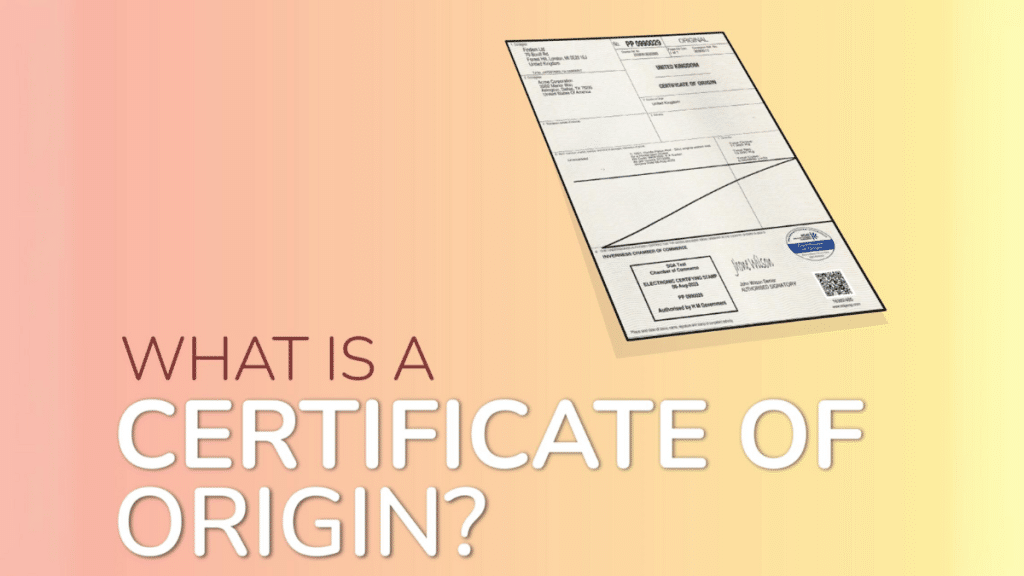When it comes to international trade, the exchange of goods between countries is a complex process. One crucial aspect of this process is the documentation required for both import and export activities. Among these essential documents, the Certificate of Origin holds a special place. Here we will explore the broader realm of import and export and then delve into the significance of certificates of origin for Indian exporters. We’ll unravel what these certificates are, why they matter, how to obtain them, and the key considerations for Indian businesses venturing into the global market.
Understanding Certificates of Origin
It is an official document integral to international trade, which serves as a concrete verification of the country of origin of the goods slated for export. It acts as proof that the products being dispatched to another nation have their roots in India, confirming the authenticity of their origin. It caters to the needs of customs authorities, importers, and even end-consumers in the destination country. By doing so, it empowers them with the knowledge needed to make well-informed decisions regarding the products they are about to receive. It helps in boosting the confidence and trust in the goods they are importing, promoting transparency and ensuring that international trade operates smoothly and without unnecessary hurdles.
Why does this document matter?
Certificates of Origin are essential for several reasons:
Customs compliance: Many countries have regulations and tariffs that vary depending on the origin of goods. Having this document helps you comply with these regulations and potentially reduce import duties, making your products more competitive in the global market.
Quality assurance: For consumers and importers, the country of origin often reflects the quality and authenticity of products. A Certificate of Origin builds trust and confidence in your goods, helping you maintain a positive reputation.
Trade agreements: India has entered into numerous trade agreements with other countries and regions. These agreements often grant preferential treatment to goods originating from India. To benefit from these agreements, you need to provide a Certificate of Origin.
Preventing fraud: They serve as a safeguard against fraudulent claims about a product’s origin. This helps maintain the integrity of international trade.
Types of Certificates of Origin
There are several types of Certificates of Origin, each designed for specific purposes. The most common types include:
Non-Preferential: This is a standard certificate used for general exports, not covered by any preferential trade agreements.
Preferential: This type is used when India has a preferential trade agreement with the destination country. It helps your products qualify for preferential tariff rates.
Generalized System of Preferences (GSP): This certificate is for goods that qualify for the Generalized System of Preferences (GSP), a program aimed at promoting economic development in beneficiary countries.
How to Obtain a Certificate of Origin
Obtaining this document in India is a relatively straightforward process. Here’s a step-by-step guide:
Eligibility check: Determine whether your goods qualify for a preferential Certificate of Origin under a specific trade agreement. You can find information about eligibility in the respective trade agreement documents or by consulting with a local trade promotion authority.
Document preparation: Gather all necessary documents, such as the commercial invoice, packing list, bill of lading, and other relevant paperwork.
Apply to an issuing authority: Contact the designated issuing authority in India. This could be a chamber of commerce, export promotion council, or another government-recognized body. They will provide you with the necessary application form.
Fill out the application: Complete the application form with accurate information about your goods, their origin, and the trade agreement you want to benefit from.
Supporting documents: Attach the required supporting documents, including the commercial invoice, packing list, and any other documents requested by the issuing authority.
Pay fees: Pay the required fees for processing the Certificate of Origin application.
Verification: The issuing authority will verify your application and supporting documents.
Certificate issuance: If everything is in order, the issuing authority will provide you with the Certificate of Origin.
Submission to customs: Submit it along with other shipping documents to the customs authorities at the port of export.
Key considerations for Indian exporters
As an Indian exporter, here are some key considerations to keep in mind when dealing with Certificates of Origin:
Stay informed: Stay updated on the trade agreements between India and other countries. Regulations and agreements can change, so it’s essential to be aware of the latest developments.
Document accuracy: Ensure that all the information in your certificate is accurate. Any discrepancies or errors could lead to delays and complications at customs.
Processing time: Be aware that the processing time for these certificates may vary depending on the issuing authority and the type of certificate. Plan ahead to avoid any last-minute hassles.
Costs: Factor in the costs associated with obtaining this document when pricing your products for export. These costs can include application fees and any charges from the issuing authority.
Record keeping: Maintain records of all your documents, as you may need to refer to them for future shipments or audits.
Utilize export promotion councils: Many export promotion councils in India offer valuable assistance in the export process, including help with this document. Make use of these resources to streamline your exporting operations.
Summary – Certificates of Origin are an indispensable part of international trade for Indian exporters. They provide credibility to your products, enable you to benefit from trade agreements, and help ensure smooth customs clearance. By understanding the types of certificates, the application process, and the associated considerations, Indian exporters can navigate the world of international trade more effectively and profitably. They can also take advantage of numerous programs available to make exporting easy for them. One such program is Amazon Global Selling, which provides you access to 18 international marketplaces and millions of importers worldwide. So, make sure you’re well-prepared and compliant to maximize the potential of your exports.
